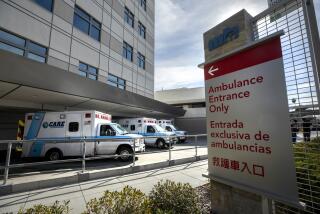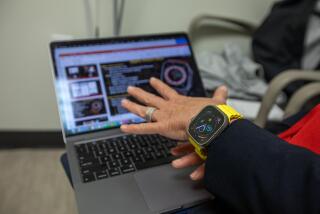Health Providers Hope for Boost From High Tech
- Share via
In the face of drooping revenues and declining patient admissions throughout the health care industry, two Orange County-based companies have teamed up to develop a glitzy, high-tech system they hope will also be a major revenue-booster.
Comprehensive Care Corp., which operates the CareUnit chain of 160 drug- and alcohol-treatment centers in 33 states, and United Western Medical Centers, operator of six Orange County hospitals, think that a merger of television, computers and video marketing techniques will help bring more patients to their doors.
B. Lee Karns, CompCare’s founder, president and chairman, said that the system still is in the research and development stage and that his company doesn’t know how much revenue it will generate once it comes on line.
And Wayne Schroeder, executive director of United Western Medical Centers, said he is sure that the system will work but declined to estimate the revenues he expects his hospitals will garner.
Karns is so confident in the system, called VideoHealth, that his company has purchased a 55% share, leaving United Western with 45%.
Schroeder said he turned to CompCare as a partner because of the company’s marketing expertise: CompCare spent approximately $18 million marketing its services during its fiscal 1986.
VideoHealth, Schroeder said, is an electronic system that can link hospitals to doctors and doctors to their patients and can help persuade people to use the services of CompCare and United Western. He also said the system can help educate the public about certain illnesses.
Schroeder claims that no computer network with similar capabilities exists.
Schroeder and Karns refuse to disclose how much their companies have invested in VideoHealth, making it virtually impossible to determine the actual scope of either corporation’s plans for the electronic system. Schroeder did say, however, that United Western spent $1.2 million to develop the product.
Larry Selwitz, an analyst with Bateman Eichler, Hill Richards Inc. in Los Angeles, said it is difficult to analyze the new company without knowing about its finances.
He said, however, that he has been “exposed to programs similar to this over the years and almost none have done anything to develop revenues for companies.”
Conceived in late 1985 by Schroeder, VideoHealth is intended to be sold in two markets, composed of physicians and potential patients.
Schroeder said that while Videohealth eventually will be used to link doctors to hospitals around the country, currently only 150 doctors affiliated with United Western’s six Orange County facilities are in the data base. Through a VideoHealth computer link, doctors can electronically admit patients and update the progress of the patients once they are admitted.
Through lap-top portable computers, which Western Medical plans to rent to patients for $10 a month, doctors are electronically linked to their patients and can find out whether a patient is taking medication properly and check up on other post-hospitalization conditions.
Sales Opportunities
And the hospitals can, in turn, sell products to the doctor through the system--which is exactly what Schroeder intends to do. Western Medical offers a line of doctor’s office supplies and, Schroeder said, “this will be extended throughout the network.”
At the same time, Schroeder and CompCare hope that a well-placed series of slick, six-foot-high kiosks--which Schroeder said cost less than $50,000 each--will lure potential patients to Care Units and to United Western-affiliated physicians.
If he can get the right people interested in the kiosks, Schroeder said, he hopes to begin placing them in senior citizen centers, courthouses and shopping centers. Currently, only four kiosks are in operation--all in the lobby of Schroeder’s Western Medical Center in Santa Ana.
It is from skillful use of this part of the VideoHealth system that CompCare hopes to profit most.
“Our goal is to prove to ourselves that we can enlarge our (patient) population” by creating a greater awareness of CompCare, Karns said.
But the company won’t be able to quantify that increase until the research and development period ends--which is at least six months away.
Schroeder is enthusiastic in describing the operation of a VideoHealth kiosk: The video player in the kiosk is activated by the body heat of an approaching person. The machine displays a list of various afflictions--ranging from drug and alcohol abuse to stress, cancer and diabetes. From that menu, a potential patient selects a disease or substance abuse and presses the appropriate “answer box” on the screen to answer a series of questions about symptoms or behavior patterns.
Not a Diagnosis
After a test is taken, a caveat appears on the screen--”the widows and orphans clause,” as Schroeder calls it--which explains that the test does not provide a diagnosis and should not be considered one.
Potential substance-abuse patients are encouraged to contact one of the 150 United Western Medical Center physicians or a “CompCare approved specialist in chemical dependency” if their responses “raise any doubts” about their condition.
Participating doctors’ photographs and credentials then are displayed, and the kiosk user can get a printout of a specific doctor’s location and even use the phone attached to the kiosk to call for an immediate appointment.
Karns said he believes that VideoHealth represents the “next generation in medical services marketing.”
Schroeder believes that, through the system, he can reach the 1,000 physicians affiliated with his medical centers without a lot of paper changing hands. “That’s a substantial cost savings for a $170-million-a-year institution,” he said. And, Schroeder continued, if each of those physicians adds one patient as a result of VideoHealth, it could mean nearly 100 new patients for United Western hospitals, since averages show one of 12 such patients admitted by United Western.
More to Read
Inside the business of entertainment
The Wide Shot brings you news, analysis and insights on everything from streaming wars to production — and what it all means for the future.
You may occasionally receive promotional content from the Los Angeles Times.










